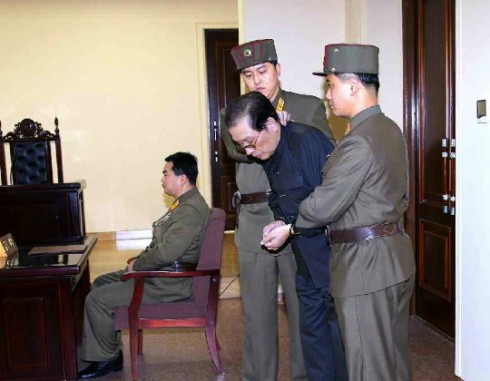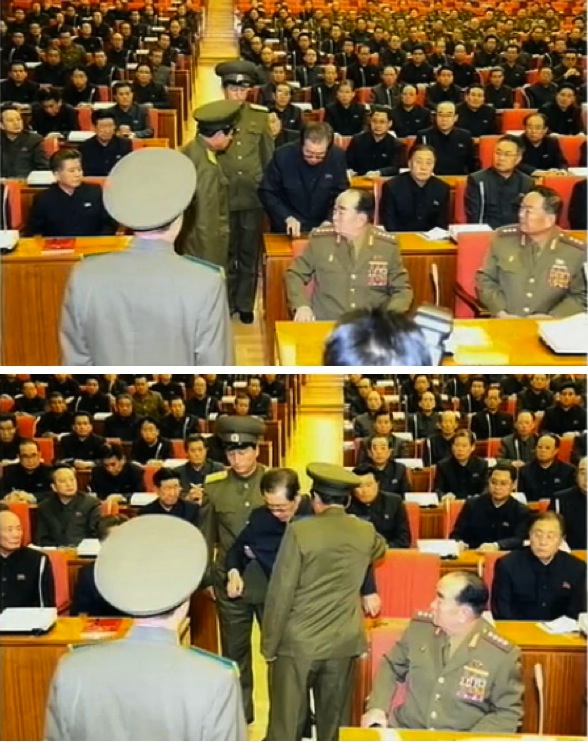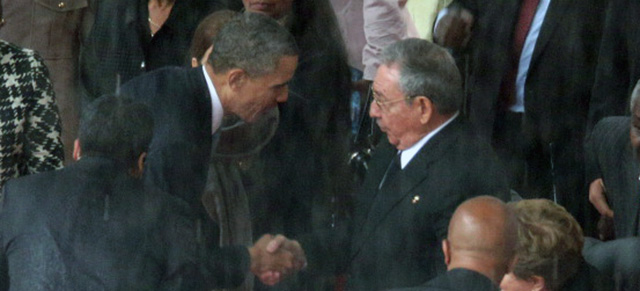Spregevole feccia umana, peggio di un cane. Il
comunicato con il quale l'agenzia di stampa ufficiale nordcoreana ha reso nota l'esecuzione di Jang Song-taek è già un pezzo di storia del comunismo. Un documento di rara ferocia, redatto in una prosa incalzante e ansimante, allo stesso tempo tragico e ridicolo, un esempio illuminante di quali estremi possa raggiungere la propaganda in uno stato totalitario.
The Atlantic si prende la briga di
analizzare il testo nei suoi punti essenziali. Questo post è dedicato a quelli che pensano che se gli Stati Uniti sono in possesso di armi nucleari è normale che debbano poterle produrre anche altri regimi. La foto che segue invece testimonia l'arrivo di Jang Song-taek nella sala del tribunale speciale che lo ha condannato a morte.

Come ogni purga che si rispetti, a parte l'eliminazione politica (e fisica) dell'accusato, anche questa porta con sé un messaggio per gli altri alti funzionari:
The Japanese newspaper Mainichi Shimbun has reported
the execution of Ri Chol, another Kim family confidante who, prior to
getting wrapped up with Jang and business deals in China, had been a
childhood protector of Kim Jong Un and the family fortune in
Switzerland. Other aides may meet the same fate, but the vast majority
of Jang’s patronage network will likely be given the chance to repent
for their sins. This, in fact, is now the message to the public at
large: Make a clean break with any lingering affections for Jang and his
foreign-flavored brand of leadership.
Ma c'è un punto specialmente significativo che spicca tra le ragioni della sua condanna, secondo quanto esposto nel comunicato: la mancanza di entusiasmo nell'appoggio alla successione ereditaria disposta da Kim Jong-il. Quella che avrebbe tutto il sapore di una vendetta personale attuata da Kim Jong-un nei confronti dello zio si manifesta in un particolare grottesco: Jang Song-taek non avrebbe applaudito abbastanza forte e abbastanza a lungo nella cerimonia di insediamento del rampollo a vice-presidente della
Commissione Militare Centrale.
The notion of a death sentence for tepid applause is both tragic and
easily parodied. KCNA is unintentionally echoing the inmate’s anecdote
in Aleksandr Solzhenitsyn’s The Gulag Archipelago of a man
imprisoned in the Soviet Union for being the first to stop clapping for
Stalin near the end of a 10-minute ovation. And clearly the “towering
resentment” Jang evoked is to be read retrospectively; no one noted the
slight publicly at the time. Jang might have been more mindful of the
example of his old rival, General Ri Yong Ho, who appeared to be
borderline insubordinate during the outrageously campy and ebullient
performance given by the gesticulating, babbling Kim Jong Un at his
first on-site inspection as leader in January 2012. If the clapping
accusation is merely a pretext for removing Jang, perhaps it is
tragicomic. Far scarier is the idea that North Korean officials may take
the charge seriously and feel that unenthusiastic applause, or the
slightest downgrading of the Kimist personality cult, is tantamount to a
criminal offense against the very sovereignty of North Korea.
Jang Song-taek non è solo una vittima del sistema che egli stesso ha contribuito a consolidare. La sua storia è soprattutto l'ennesima dimostrazione di come i regimi totalitari tendano a cannibalizzarsi, ad inghiottire se stessi, ad autodistruggersi. Dove finirà la purga? Quanti altri esponenti del vertice politico nordcoreano ne saranno coinvolti? Forse uno, forse molti. Impossibile saperlo, dipende dalle circostanze, dalle percezioni, dall'entità dei sospetti che la paranoia ideologica è in grado di alimentare. Ecco rivelata la funzione essenziale di una condanna di alto livello come questa: nessuno può né deve sentirsi al sicuro. Il Partito ha lanciato una campagna di tensione a livello nazionale, un avvertimento collettivo: state attenti a quel che fate, a quel che dite, a quel che pensate. Non solo. Per le dittature come quella di Pyongyang il tempo è circolare e il passato non è mai passato realmente. Le immagini di Jang Song-taek sono scomparse dai documentari e dalle immagini ufficiali poco prima della sua esecuzione, la prova che il regime può agire a trecentossanta gradi, plasmando non solo il presente e il futuro ma anche gli eventi già accaduti. Tutti sono in pericolo, non solo per quel che potrebbero fare da oggi in avanti ma anche e soprattutto per quello che il potere potrebbe pensare delle loro azioni già compiute, perfino quelle che siano state oggetto di pubblica approvazione.
Ma, al di lá della minaccia del terrore, è una mossa intelligente aver sacrificato un esponente di spicco così vicino alla famiglia Kim in modo tanto plateale?
C'è chi pensa allora che la decisione sia stata presa da altri:
The scale of the publicity is a surprise for other reasons, according to
Jang Jin-sung, a former propaganda official who defected to South Korea
in 2004. He thinks it suspicious that the purge took place in a
Politburo meeting. Kim Jong Il rarely convened such pow-wows; after all,
quietly orchestrated dismissals were made at his sole discretion. That
Mr Jang’s ouster took place in such a public setting suggests that it
was out of Mr Kim’s hands, he says—as do the charges of womanising,
which damage Ms Kim and, by extension, the young Mr Kim himself. Another
oddity is that the news was broadcast first to the outside world on
KCNA, and only then on internal media. Previous purges were usually
publicised (if at all) weeks or months after the event.
Una purga anti-Kim? Una purga
anti-Cina? O tutto il contrario? Cremlinologia applicata alla realtà nordcoreana. Esercizio quasi impossibile,
ai limiti dell'inutilità:
Whether Jang in fact planned to execute a coup or whether he was eliminated in an effort by Kim Jong Un to consolidate power -- or some other scenario - remains unknown, but in the words of the KCNA, he is now a traitor for all eternity.
Whether
Jang in fact planned to
execute a coup or whether he was eliminated in an effort by Kim Jong Un
to
consolidate power -- or some other scenario - remains unknown, but in
the words
of the KCNA, he is now a traitor for all eternity. - See more at:
http://blog.foreignpolicy.com/posts/2013/12/13/jang_song_thaeks_execution_is_even_weirder_than_you_think#sthash.HIHflAT8.dpuf
Whether
Jang in fact planned to
execute a coup or whether he was eliminated in an effort by Kim Jong Un
to
consolidate power -- or some other scenario - remains unknown, but in
the words
of the KCNA, he is now a traitor for all eternity. - See more at:
http://blog.foreignpolicy.com/posts/2013/12/13/jang_song_thaeks_execution_is_even_weirder_than_you_think#sthash.HIHflAT8.dpuf




